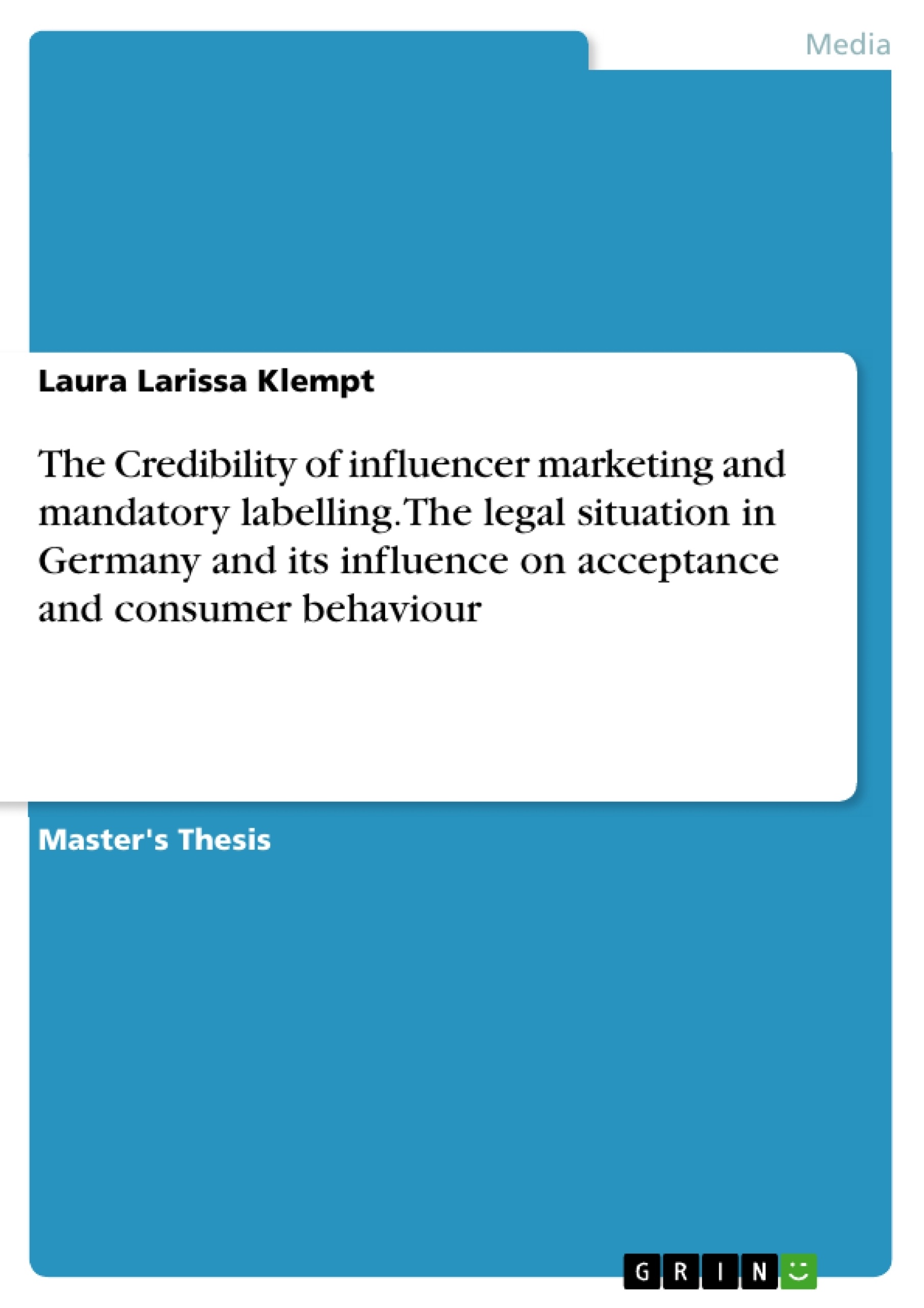Following the wave of warning letters and court proceedings regarding surreptitious advertising, the increasing popularity of influencer marketing also reveals the legal dimension of this topic. The lack of legal certainty in this area results from trade association activities, such as the Association for Social Competition which systematically sue many influencers and collaborating companies for disguising the promotional nature of paid contributions on social platforms such as Instagram.
Against this background, this dissertation examines in further detail the controversial scope of labelling and disclosure obligations for influencers in social media such as Instagram and considers the associated issue of "credibility of influencer-marketing" and potential effects on consumer-behaviour. This assessment is further supported by empirical data collected which is carried out with qualitative and quantitative research methods in order to establish (tentative) hypotheses based on research phenomena and consumer-behaviour pattern.
In summary, mandatory labelling and disclosure requirements do not seem to "ruin" the credibility of influencer-marketing and do not take a major influence on consumer acceptance and -behaviour. Acceptance and market behaviour rather seem to be driven by other factors, including the character of the products and the company involved and the personal fit with the profile of the respective influencers. The research-project is limited to the consideration of influencer-marketing and compliance with legal obligations in Germany.
Inhaltsverzeichnis (Table of Contents)
- Abstract
- 1. Introduction
- 2. Legal Framework: Labelling and Disclosure Obligations for Influencers
- 2.1. Development of Online Advertising and Influencer Marketing
- 2.2. Legal Framework - Development and Analysis
- 2.2.1. Current Legal Situation in Germany
- 2.2.2. Analysis of Court Decisions
- 2.2.3. Legal Perspective on Influencer Marketing in Germany
- 2.3. Practical Implications of Legal Regulations
- 3. Empirical Research: Consumer Behaviour, Credibility and Transparency
- 3.1. Conceptualisation of Credibility in Influencer Marketing
- 3.2. Survey and Case Study
- 3.2.1. Research Design
- 3.2.2. Data Analysis
- 3.3. Results and Findings
- 3.3.1. Survey Results and Interpretation
- 3.3.2. Case Study Results and Interpretation
- 3.3.3. Correlation between Consumer Behaviour, Transparency and Credibility
- 4. Discussion and Conclusion
- 5. Limitations of Research and Future Research Directions
Zielsetzung und Themenschwerpunkte (Objectives and Key Themes)
The dissertation examines the legal and empirical aspects of influencer marketing in Germany, focusing on the credibility of influencer marketing and the impact of mandatory labelling on consumer behavior. It aims to provide a comprehensive understanding of the current legal situation regarding labelling and disclosure obligations for influencers on social media platforms, specifically Instagram, and to assess its influence on the perceived credibility of influencer marketing and subsequent consumer behavior.
- Legal framework for influencer marketing in Germany
- Mandatory labelling and disclosure requirements
- Impact of labelling on consumer behavior
- Credibility of influencer marketing
- Consumer perception of influencer marketing
Zusammenfassung der Kapitel (Chapter Summaries)
Chapter 1 provides an introduction to the topic, outlining the dissertation's objectives and research questions. Chapter 2 delves into the legal framework of influencer marketing in Germany, exploring the development of online advertising and influencer marketing, analyzing court decisions and identifying current legal regulations. Chapter 3 presents the empirical research, investigating consumer behavior, credibility and transparency in influencer marketing through a survey and case study, and discussing the correlation between these elements.
Schlüsselwörter (Keywords)
Influencer marketing, legal framework, labelling, disclosure obligations, consumer behaviour, credibility, transparency, social media, Instagram, Germany, empirical research, survey, case study.
Frequently Asked Questions
How does mandatory labelling affect influencer credibility in Germany?
Research findings suggest that mandatory labelling and disclosure requirements do not significantly "ruin" the credibility of influencer marketing or majorly alter consumer behavior.
What are the legal disclosure obligations for influencers on Instagram?
Influencers must clearly label paid contributions to avoid "surreptitious advertising," a legal requirement enforced by court decisions and trade associations in Germany.
What factors drive consumer acceptance in influencer marketing?
Acceptance is primarily driven by the "personal fit" between the influencer and the product, the character of the company involved, and the transparency of the communication.
What research methods were used in this dissertation?
The study utilized both qualitative and quantitative empirical research methods, including surveys and specific case studies to analyze consumer behavior.
Why is there legal uncertainty regarding influencer marketing in Germany?
Uncertainty stems from systematic lawsuits by competition associations and evolving court interpretations of what constitutes a "commercial purpose" in social media posts.
- Quote paper
- Laura Larissa Klempt (Author), 2019, The Credibility of influencer marketing and mandatory labelling.The legal situation in Germany and its influence on acceptance and consumer behaviour, Munich, GRIN Verlag, https://www.grin.com/document/494775



